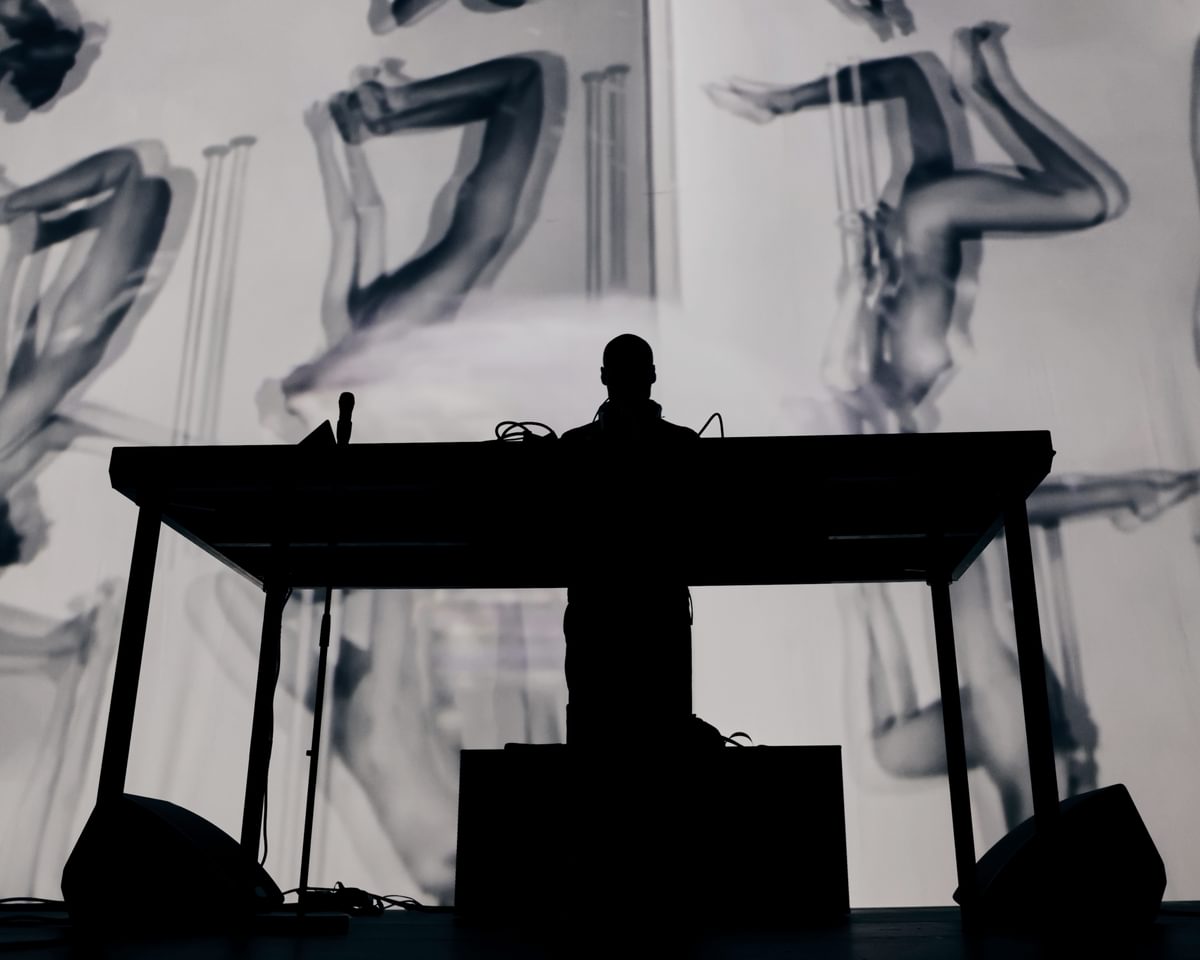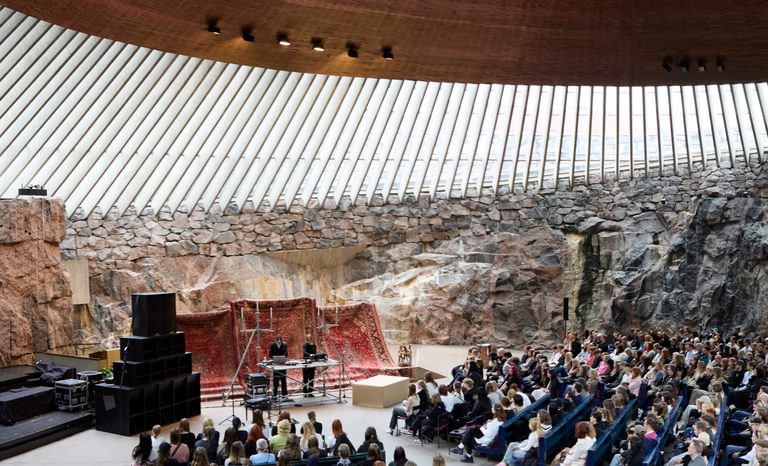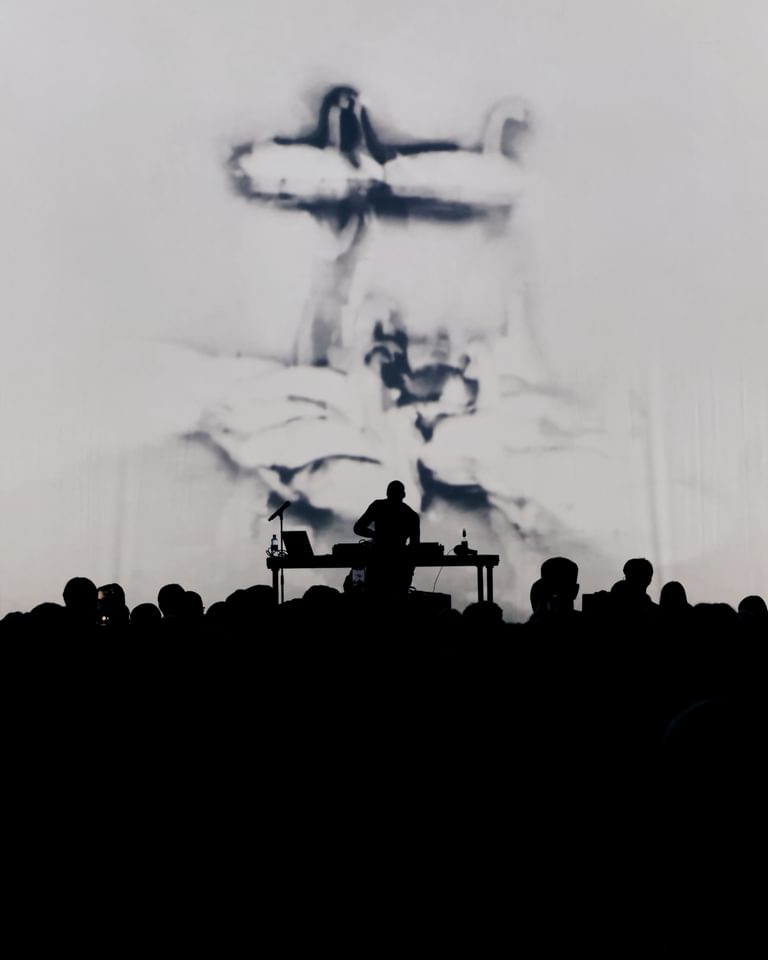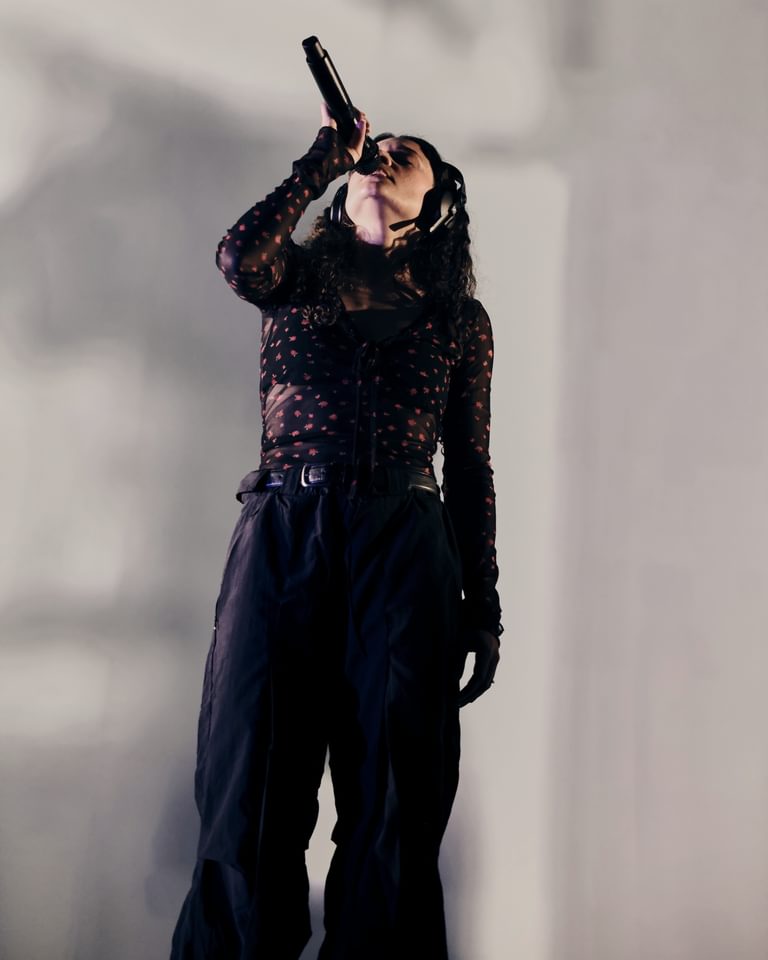
Helsinki Music Week kicks off with a subcultural bang
Finland’s capital embraces underground scenes with the launch of Helsinki Music Week – a bold fusion of experimental sound, DIY spirit, and Nordic mystique.
Adorned, ruffled, otherworldly crowds mingle across the stomping ground of a disused cable factory, Tanssin Talo. Ceilings loom high in darkness as its colourful participants amble below.
Stepping into Helsinki Music Week feels like entering a film set - one that blends sci-fi, rom-com, dystopia, and kawaii dreamscapes into an enthralling space by way of its attendees. Characters from every imaginable modern-age genre and era glide past: 90s skaters and Y2K twenty-somethings, ravers, goths, punks, creatures of myth. Helsinki Music Week has got it all, in oodles. The creativity and individuality thriving in Europe’s second most northernmost capital is undeniable. Here, the obscure and surreal have found simultaneously a birthplace and a zone to thrive.
“Recently Helsinki is seeing a wave of DIY clubbing, queer nightlife, and post-internet art scenes”, echoes Pau Kraus, co-founder of Helsinki Music Week (HMW). Fashion, the arts and music have long been intertwined - from the punk movement of the 1970s, which turned ripped tees and safety pins into political statements, to the 90s rave scene’s neon rebellion against mainstream aesthetics, subcultures have always shaped - and been shaped by - the underground pulse of creative expression.
8 May welcomed the inaugural three-day event to Finland’s bitter, frosty shores. A nordic archipelago seems somewhat a niche spot to house a hub of international talent, though to locals the platform extends a long-awaited handshake, greeting new talent from abroad while offering a celebration of its own sound. To be found in this year's lineup? The post-internet complexity of Irish-Chilean experimental DJ Sega Bodega, the lo-fi soft R&B musings of Erika de Casier, Lust For Youth’s post-punk-vocal-glitch soundscapes and the raw, British grit of EsDeeKid to name but a few on the diverse set list.
Downtime during the festival is rife with sensory experiences, from rich culinary culture to wellness rituals. The scent of birch fills the thick air of one of Finland’s estimated 3.5 million saunas. The culprit? Vihta. A small bunch of branches dipped in water and gently thwacked across the skin to encourage circulation. Kyro Distillery, also home to Europe’s ‘accidental’ Best Gin & Tonic, is plonked in the middle of the city - in a shopping centre, actually - and offers a gentle break from the festival alongside a deep-dive into the Finnish way of life.

“We’re born in saunas, we die in saunas”, a member of staff declares. (This is also historically true, as the high temperatures offered sanitary conditions to give birth). Being present here is the key to understanding the soul of Helsinki: a city where sensations are deeply felt, and the contrast between the frigid landscape and the steamy warmth of a sauna mirrors the diverse energies pulsing through the streets during HMW. It's a celebration of sensory overload, but also of space - room to breathe, embrace novelty, and to be vulnerable. It is here at the crossroads of tradition and cutting-edge, where Helsinki’s artistic identity thrives: gritty, intimate, and alive.
“Internationally, there's a sort of Scandi mystique with the other Nordic countries, whereas Finland has always been a bit of an unknown awkward neighbour”, PR & Music Export for PME Records, Laura Jonsson tells me while attending HMW. For local Jonsson, the conception and realisation of the new festival is a delicious prospect. “I feel the other nations have gotten their flowers with international recognition”, she explains. “While Finland is the mischievous North: the music scene is incredibly active but internationally stealthy. Helsinki Music Week is bringing what we have to offer to the forefront”.
Finland is no newcomer to sonic domination, in fact, the nordic shores have a titan weighting in the global music sphere; statistics boast a whopping 53 metal bands per 100,000 people, crowning The Land of Thousand Lakes the highest contributor of every country on the map.

From the heavy realms of metal and traditional explorations of folk, as well as a wealth of classical (hailed as the birthplace of symbol of Finnish pride and infamous composer Jean Sibelius) and modern pop and contemporary, the nation firmly cements itself on the global stage. Rippling in the quiet undercurrent below main headlines, the Finnish underground scene is awash with subculture a-plenty, cogs quietly churning and wheels rotating in the shadows. The almighty metal presence nods to this trend, alongside the quality and consistency of its musicianship.
How has Finland birthed such a bountiful bouquet of diverse subculture? “I have thought about this quite a lot actually”, considers Helsinki Music Week's co-founder Pau Kraus. “I think there are a few different things that contribute to all of this. One major [reason] is the geopolitical context of Finland as a whole. Helsinki is where Scandinavian welfare meets Eastern European angst - it’s this weird melting pot of structure and emotional chaos. That tension breeds creativity.
“Social trust is also a big part of it. People are used to organising things collectively, non-commercially, and with a kind of quiet idealism. There’s room here for things to grow slowly and on their own terms. Historically, we’ve had relatively generous public funding for the arts, which gave people room to experiment. But now, with the cuts coming in, the urgency to protect and reinvent subculture is even more intense. And last but definitely not least, I think long winters also play a part. The darkness creates a need for parallel realities”.
With this in mind, the event's conception seems all the more impressive. Support from the City of Helsinki, Helsinki Partners, and Battery has helped build this structure from the ground up. Founded by a flock of 26-year-old co-creators - Dante Correa, Matti Mustonen (Glayden), Rasmus Purola, along with Kraus - Helsinki Music Week subverts the traditional ‘festival’ label. Performances, talks and club events take place over a three-day span across various venues in the city; there are industry discussions held at the funky premises of Hotel Hobo, and grungy nightlife to be found at multi-room venues Kaiku and Post Bar, while Helsinki-based electronic duo Shepherd’s Call and multi-platinum selling artist Aino Morko and her team of instrumentalists perform at the ethereal Temppeliaukio Church, incredibly built into rock in an awe-inspiring spaceship-like structure. “It’s a platform - built to host, test and support music and cultural work that doesn’t currently have a clear place within existing structures”. Correa explains.

Helsinki is well suited for this. As a capital city, it’s relatively undefined in global cultural conversations. Its lack of fixed identity adorns it the flexibility to thrive in new spaces and makes the nation uniquely functional. Correa adds, “there’s space to build, freedom to test ideas, and little pressure to conform to existing formats. Both physically and culturally, Helsinki offers room to work”. With a rich, layered history - shaped by Nordic, Baltic, and Russian influences - Helsinki is not dominated by a single cultural force or narrative, leaving it with a “certain neutrality”. “Which makes it an ideal setting for this kind of thing”, he says. “HMW brings together artists, producers, and others who are shaping contemporary music - not to showcase them, but to enable. Sometimes that means performances, sometimes collaborations, sometimes conversations”.
In Tanssin Talo on Saturday night, Sega Bodega’s closing set encapsulates the finest of the event’s lineup. His dense blend of club, ambient, pop, noise, and classical motifs meld and warp in nonlinear, patchwork fashion. There’s even a nod to the nation's heritage as Darude’s ‘Sandstorm’ makes a brief appearance. From humble beginnings DJ-ing in Glasgow in the early 2010s to latest record Dennis, his sound is laid bare, moving seamlessly between breakneck beats, vocal-led pop and ambient lullabies - an evolution accompanied by surreal, warping visuals that melt from one almost recognisable form to the next. There’s a barrage of flashing brilliant white light - the vague outlines of swans morph into a catalogue of women’s figures, a car, men’s bodies, a series of grey and brown lumps of inanimate clay-like structures. It’s a dreamlike and slightly grotesque exploration into the Uncanny-valley. Glitchy and emotive, his set winds to a thumping, euphoric crescendo.
While Sega Bodega’s set explores the obscure and abstract, Erika de Casier’s is a lesson in intimate, lo-fi 90’s R&B revival. Earlier the same day, anticipation of the bedroom-pop rising star commands the masses at Tanssin Talo. Her sound feels heavily digitally filtered and hyper-aware, playing with simplicity but relatable. Amongst sparse beats and a regular, steady tempo throughout the set, her Internet-native aesthetic oozes lonely-soul-meets-MSN appeal, having also collaborated with the likes of NewJeans and Dua Lipa, a hybrid zone of underground meets mainstream.
To understand Helsinki’s music present, we need to talk about the age of the internet - or more specifically, what follows. The term ‘post-internet’ first arose through the ranks of Gene McHugh’s blog of the same title back in circa-2009, a genre which co-founder Dante Correa mentions, is in abundance. The label focuses on three key criteria; art created for the intention of being shared online, art influenced by the web, and art created with cynicism of the online world. An internet state of mind. Visual artists soon dabbled with the likes of Marisa Olson, Artie Vierkant and Brad Troemel (aka The Jogging) who contributed to shaping the post-internet aesthetic.
It seems only just the beginning for Helsinki Music Week, as the festival strives to cement its place in the international spotlight. “What’s exciting is how it's tapped into something that already has a strong and passionate local audience” attendee Jonsson mulls in the festival’s final hours. “With an immense amount of talented producers, artists and DJ’s, I always feel giddy about what is coming out of Helsinki. We’re really well off for a relatively small capital city, with several world class electronic clubs. I couldn’t be more excited”.
Find out more at helsinkimusicweek.com
Get the Best Fit take on the week in music direct to your inbox every Friday

Lorde
Virgin

OSKA
Refined Believer

Tropical F*ck Storm
Fairyland Codex





